Introduction to Fukushima Prefecture
-
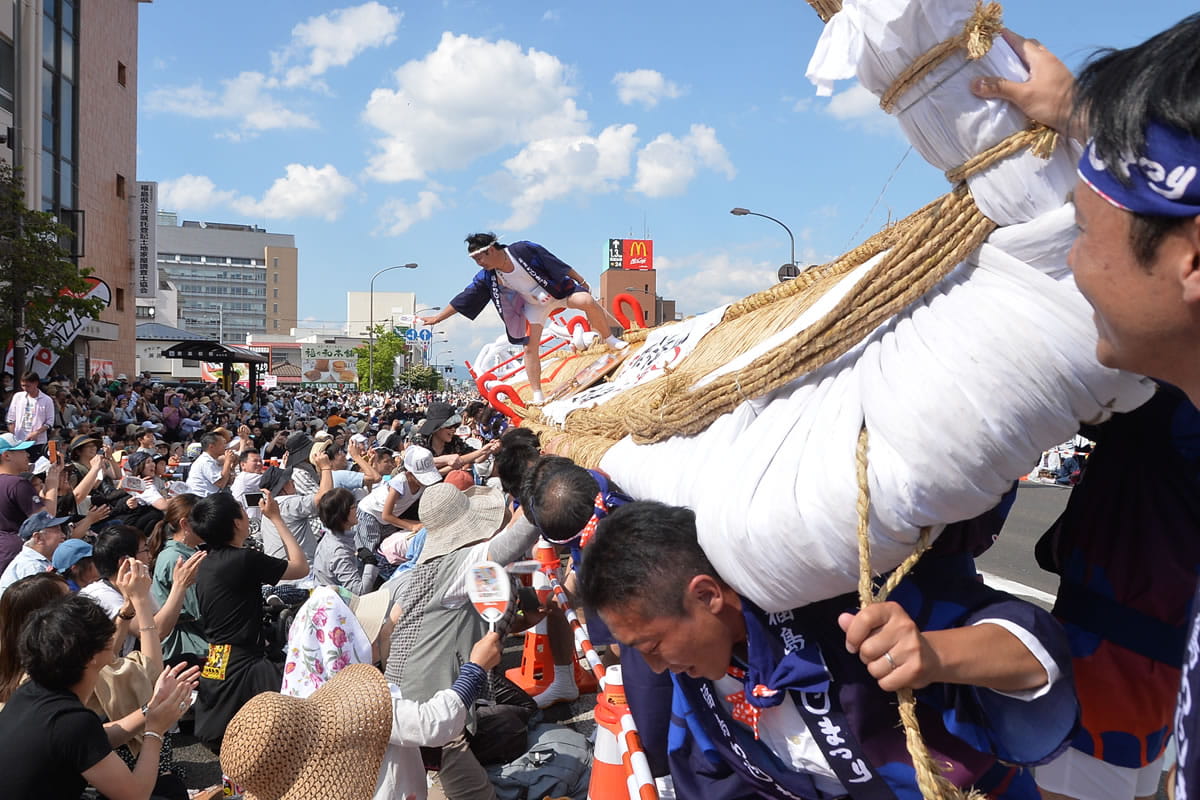
Fukushima Waraji Festival
The Fukushima Waraji Festival originates from the Akatsuki Mairi, a winter ritual that has continued for more than 400 years since the Edo period, and was created to enjoy the short summer in Tohoku. A must-see is the sight of Japan's largest waraji, measuring 12 meters in length, parading through the city. Last year marked the 50th anniversary of the festival, and the festival's legends and origins were reexamined, and the music, dance, and costumes were reborn. The new Fukushima Waraji Festival will liven up Fukushima's summer again this year.
Venue Sakaemachi, Fukushima City, Fukushima Prefecture, etc. (around National Route 13) Contact information Fukushima Waraji Festival Executive Committee (Fukushima Chamber of Commerce and Industry)
024-536-5511URL https://www.waraji.co.jp/ Access ・About 5 minutes walk from JR Fukushima Station
・About 20 minutes by car from Fukushima Iizaka IC, Fukushima Nishi IC, Fukushima Oosasao ICDate Usually held on the first Friday of August and the following Saturday Fees Free -
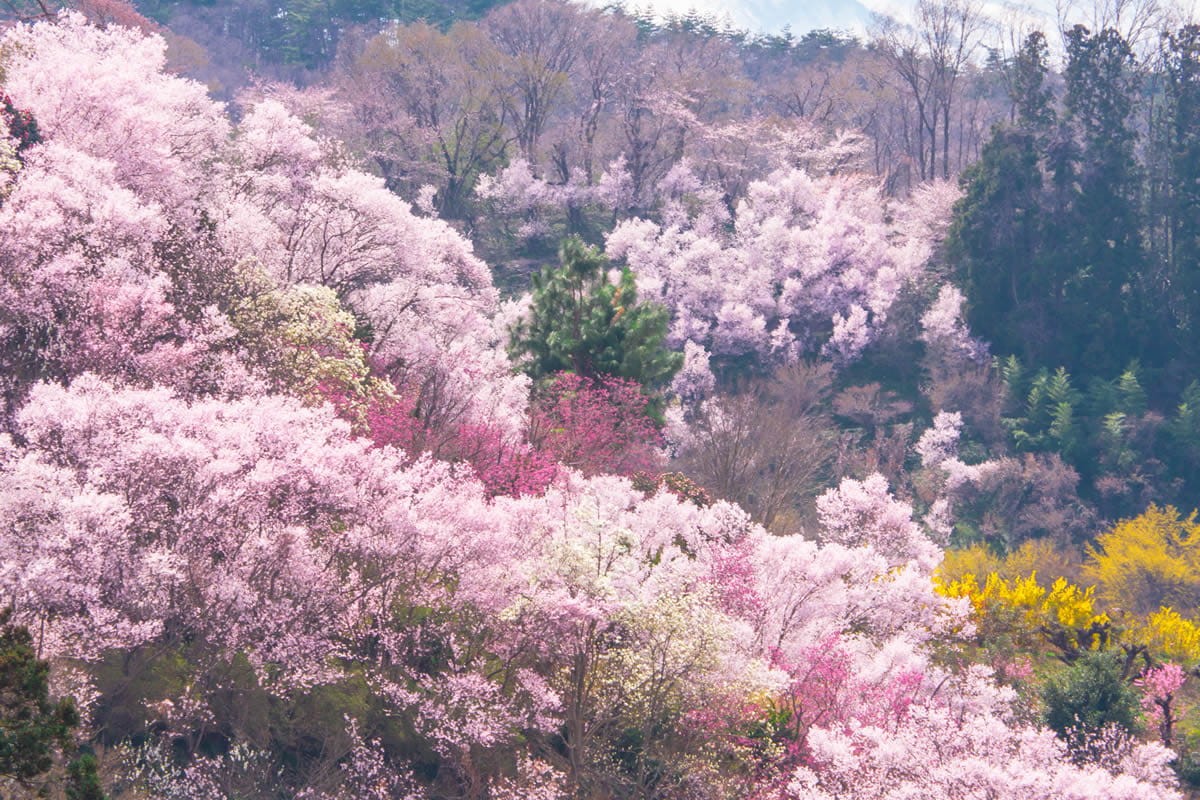
Hanamiyama
The late photographer Shotaro Akiyama hailed Fukushima City's famous flower spot as ``Fukushima is home to peach blossoms'' and introduced it to the whole country. It all began during the poverty-stricken times during the war, when flower and tree farmers spent many years clearing thickets and planting flowers to make a living. Not only plums and cherry blossoms, but also forsythia, bokeh, cornelia, magnolia, and Japanese peach are in full bloom all at once. There are many types of flowers, and the best time to see them is long, so you can enjoy a lot of them.
Address Watari, Fukushima City, Fukushima Prefecture Contact information Fukushima City Tourist Information Center
024-531-6428URL https://www.f-kankou.jp/hanamiyama/ Access [Normal season]
・Approximately 15 minutes by bus from JR Fukushima Station, then walk approximately 25 minutes after getting off
・Approximately 30 minutes by car from Fukushima Nishi IC, Fukushima Iizaka IC, and Fukushima Oosasao IC
[Cherry blossom season]
・Approximately 15 minutes by special bus "Hanamiyama" from JR Fukushima Station
・Traffic restrictions apply. My car is in a temporary parking lot.Best time to see Early to late April Fees Free -
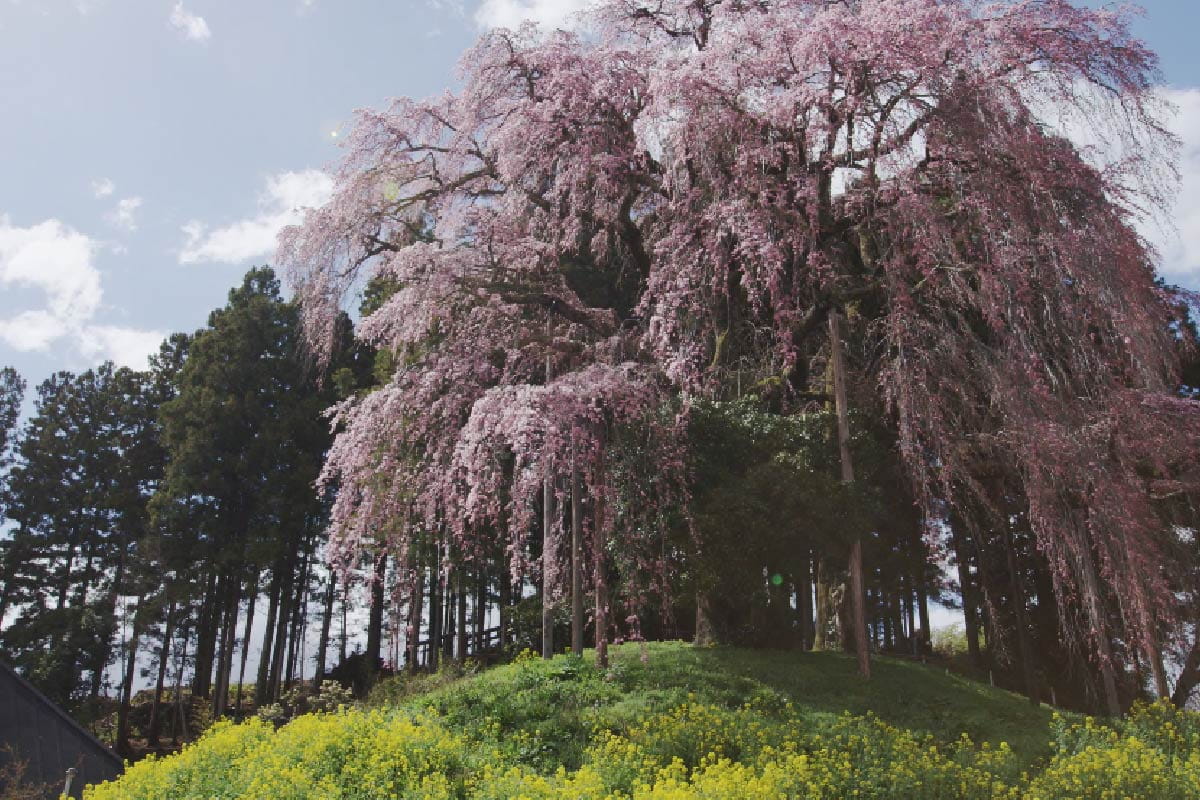
Weeping cherry blossoms on the battlefield
Two weeping cherry trees stand on the site that is said to be the battleground between Yawata Taro Yoshiie and Abe Sadato and Muneto. It is said to be a grandchild of the Miharu Takizakura, and it blooms with beautiful red flowers that look like waterfalls. The estimated age of the trees is said to be 180 years, and they are also called ``couple cherry blossoms'' because of their close-up shape. The slopes of the hills are covered with rape blossoms, and when you look up at the slopes from below, you can enjoy the beautiful contrast between the blue sky, rape blossoms, and cherry blossoms.
Address Higashishinden Obayashi, Nihonmatsu City, Fukushima Prefecture Contact information Iwashiro Tourism Association (Nihonmatsu City Iwashiro Branch Area Promotion Division)
0243-65-2803URL http://www.evergreen-net.jp/ Access ・About 30 minutes by car from JR Nihonmatsu Station
・About 35 minutes by car from Nihonmatsu ICBest time to see Mid April Fees Free -
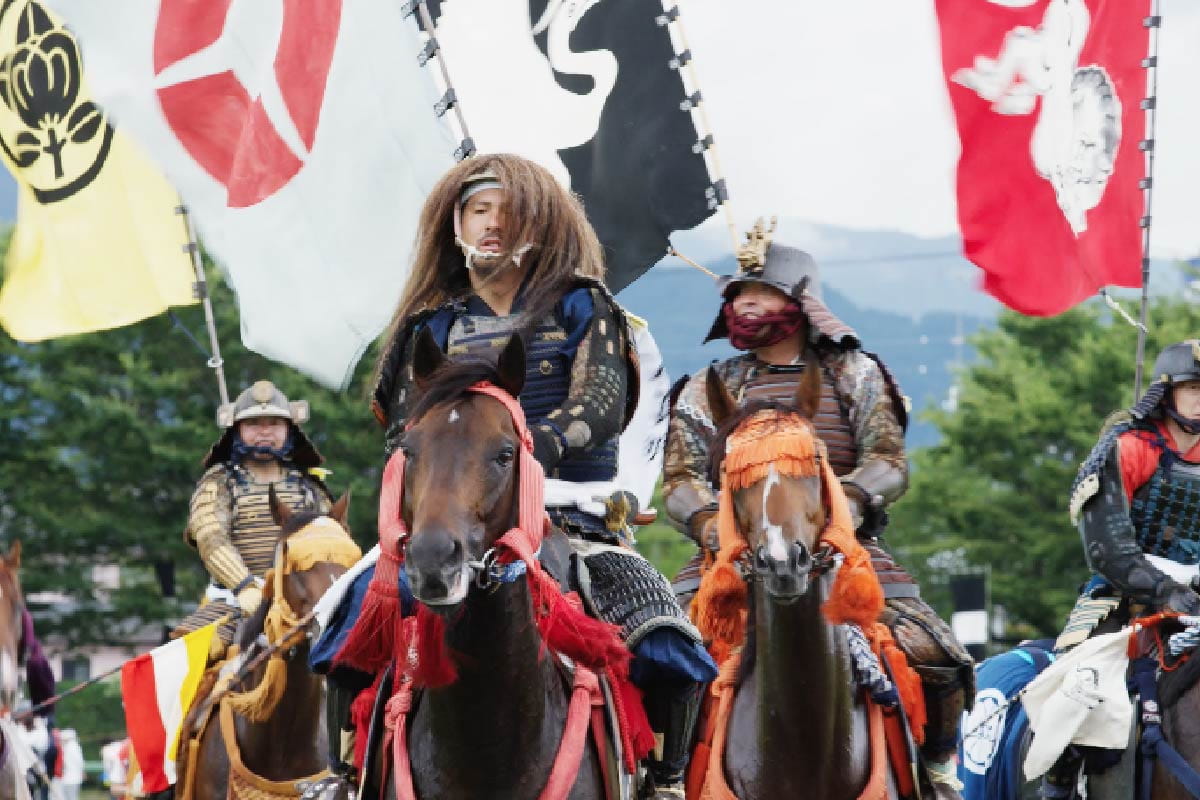
Soma Nomaoi
Soma Nomaoi, a nationally designated important intangible folk cultural property, is a traditional event held jointly by three shrines: Soma Nakamura Shrine, Soma Ota Shrine, and Soma Odaka Shrine (formerly Myoken Shrine).
Some events include the ``Procession'' in which cavalry warriors march through the city, the ``Kacchu Horse Racing'' and ``Kami Flag Battle'' held at the Hibarigahara Festival Grounds located in Haramachi Ward, Minamisoma City, and the ``Nomakake'' ritual in which a naked horse is driven into the grounds of a shrine and captured and presented in front of the shrine. It is a spectacular sight to see cavalry warriors take to the field with colorful flags waving in the wind.Venue Haramachi Ward, Minamisoma City, Fukushima Prefecture, Hibarigahara Festival Ground, etc. Contact information Soma Nomaoi Executive Committee Secretariat
0244-22-3064URL http://soma-nomaoi.jp/ Access ・About 10 minutes by car from JR Haranomachi Station
・About 15 minutes by car from Minamisoma ICDate Saturday, Sunday, and Monday of the last week of July every year Fees Advance ticket 800 yen, same-day ticket 1,000 yen, free for children (3rd year of junior high school and below) -
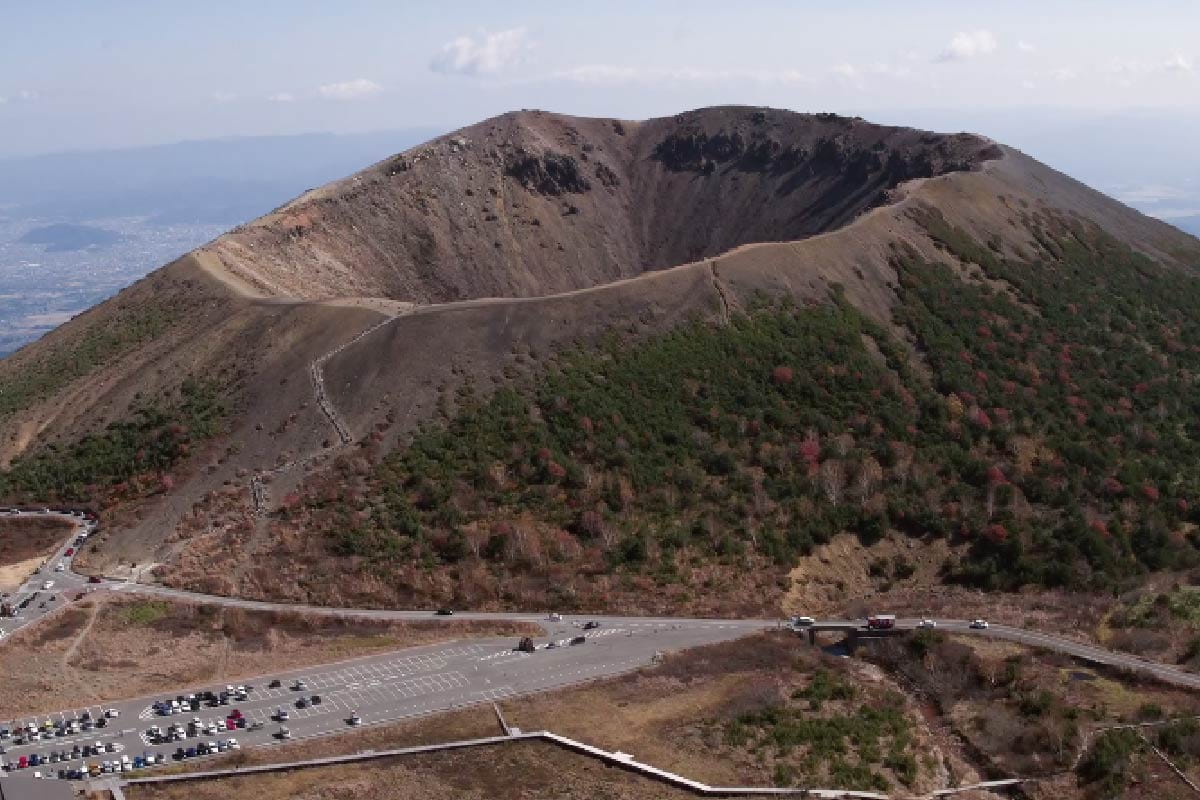
Azuma Kofuji
Azuma-kofuji, which has an altitude of 1,707m and can be climbed to the crater in about 10 minutes from the Joudodaira parking lot. It has a beautiful shape similar to Mt. Fuji, and in early spring, snow formations (lingering snow) called ``Seed Rabbit'' and ``Azuma's Snow Rabbit'' can be seen from the foot of the mountain. After climbing the mountain while looking at the desolate sand and gravel mountain surface, you will be greeted with a vast panoramic view of the Fukushima Basin. The view of the crater, which is approximately 500m in diameter, is spectacular, and we recommend walking around the crater. The road is narrow and there are cliffs on both sides, so it's thrilling!
Address Mt. Washikura (Jododaira), Tsuchiyu Onsen Town, Fukushima City, Fukushima Prefecture Contact information Jododaira Visitor Center (closed in winter)
0242-64-2105
Winter contact: Azuma Jododaira Information Center
024-591-3600URL https://jododaira-vc.jp/ Access ・Approximately 1 hour by bus from JR Fukushima Station (must confirm operation status)
・Approximately 1 hour by car from JR Fukushima Station
・Approximately 1 hour by car from Fukushima Nishi IC, Fukushima Iizaka IC, and Oosasao ICClosed period Winter: Mid-November to early April Fees Jododaira parking lot usage fee
Motorcycle: 200 yen
Ordinary car: 500 yen
Microbus: 1,000 yen
Large bus: 2,000 yen -
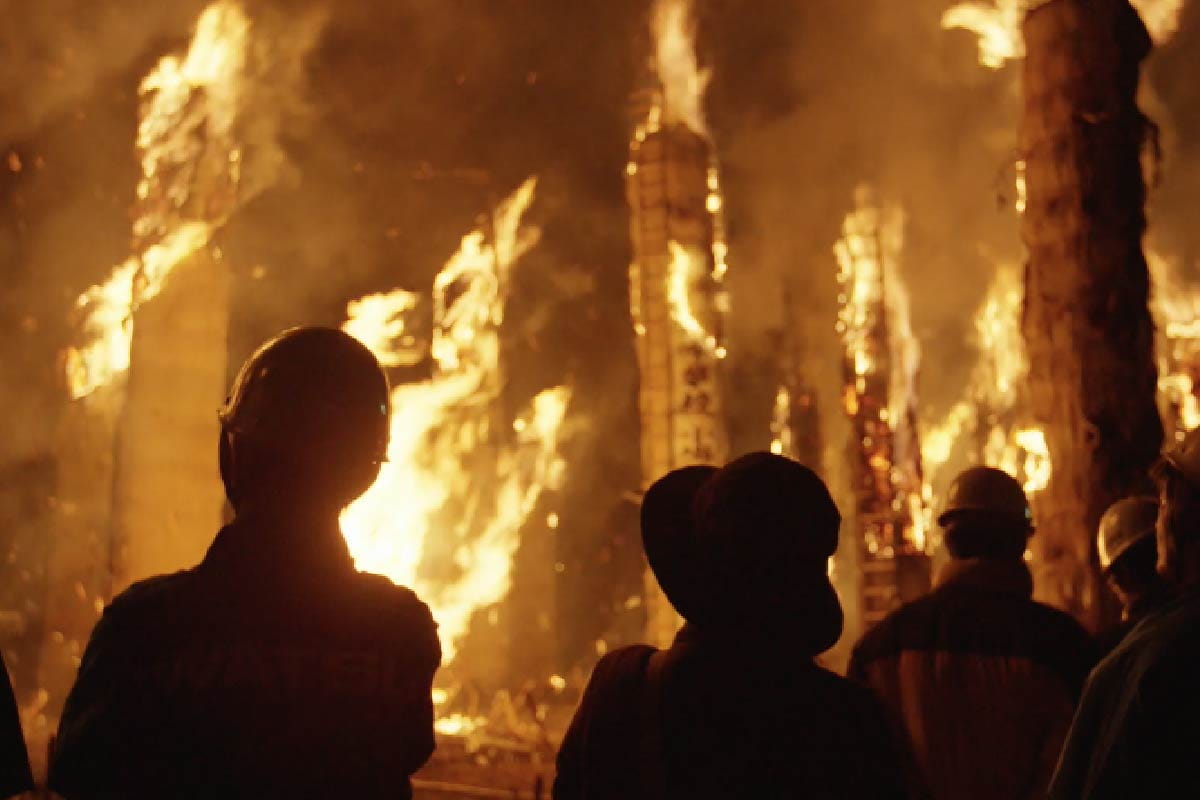
Sukagawa torch evidence
A fire festival that boasts a tradition of over 420 years. It is said that this festival was started to mourn the spirits of the many soldiers who lost their lives in the battle when Masamune Date's army attacked Sukagawa Castle. The huge torch, which is 10 meters long and weighs 3 tons, is carried by the young people of Sukagawa and paraded through the city before being erected on Mt. Goro. The flames of the torches swaying to the roar of the torch drums are truly a picture scroll of the Great War. In addition, ``Taimatsu Akashi'' is included in the ``Haiku Saijiki'' as a winter season word.
Venue Around Nakamachi, Sukagawa City, Fukushima Prefecture (Tachimatsu Street)
Mt. Goro (inside Midorigaoka Park)Contact information Torch Testimony Executive Committee
0248-88-9144URL https://www.sukagawa-kankoukyoukai.jp/Event/page08.html Access ・Approximately 15 minutes on foot from JR Sukagawa Station
・Approximately 5 minutes by car from Sukagawa IC (temporary parking is available in the city on the day of the event.)Date Held on the second Saturday of November every year Fees Free -
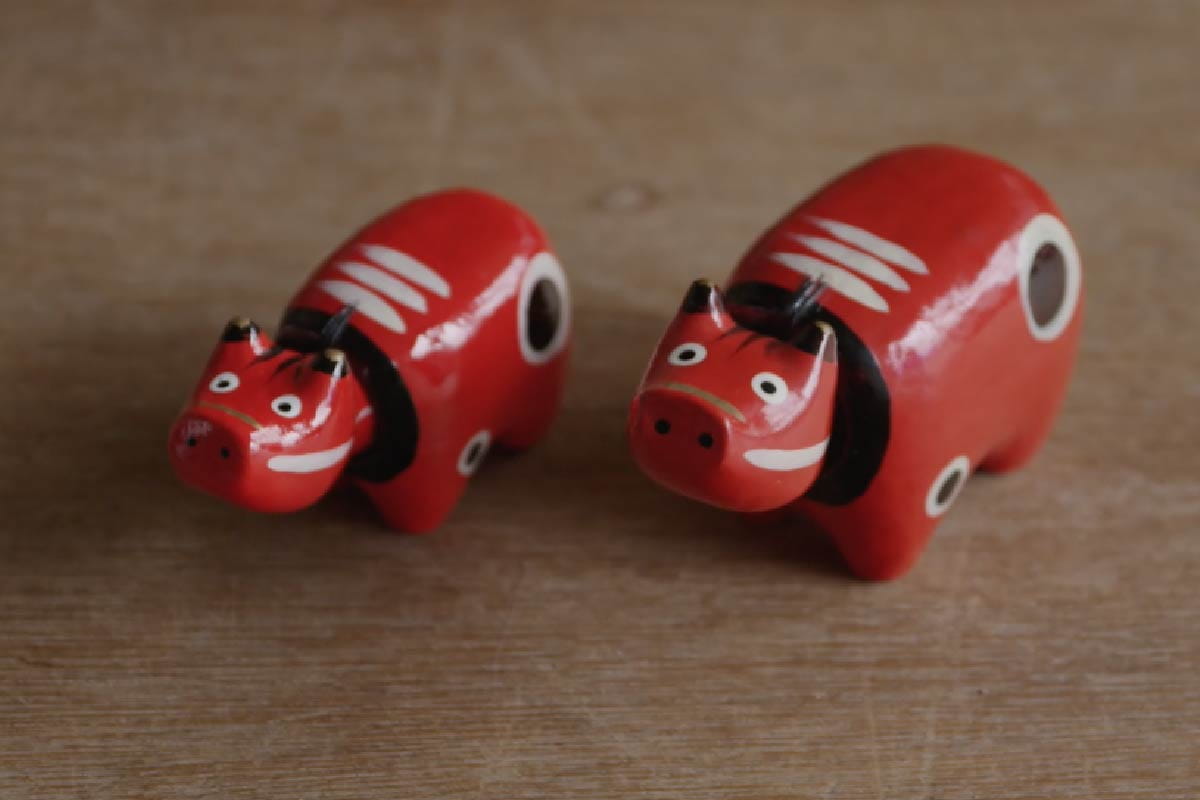
Aizu papier-mâché
The origin of Aizu papier-mâché is said to be that when Ujisato Gamo, who served Toyotomi Hideyoshi, was ordered to change provinces as the feudal lord of Aizu, he invited a puppet maker from Kyoto to help feed the lower-ranking samurai, in an effort to revive the production. Many Aizu papier-mâchés, such as ``Akabeko,'' are colored with red as the base color, and are popular in people's lives as objects that pray for the healthy growth of children, items that ward off bad luck and evil spirits, and auspicious objects that bring good harvests and prosperous business.
Address Nishiaizu Town, Yama District, Fukushima Prefecture Contact information Nishiaizu Town Commerce and Tourism Division
0241-45-2213URL https://www.town.nishiaizu.fukushima.jp/site/kanko/815.html -
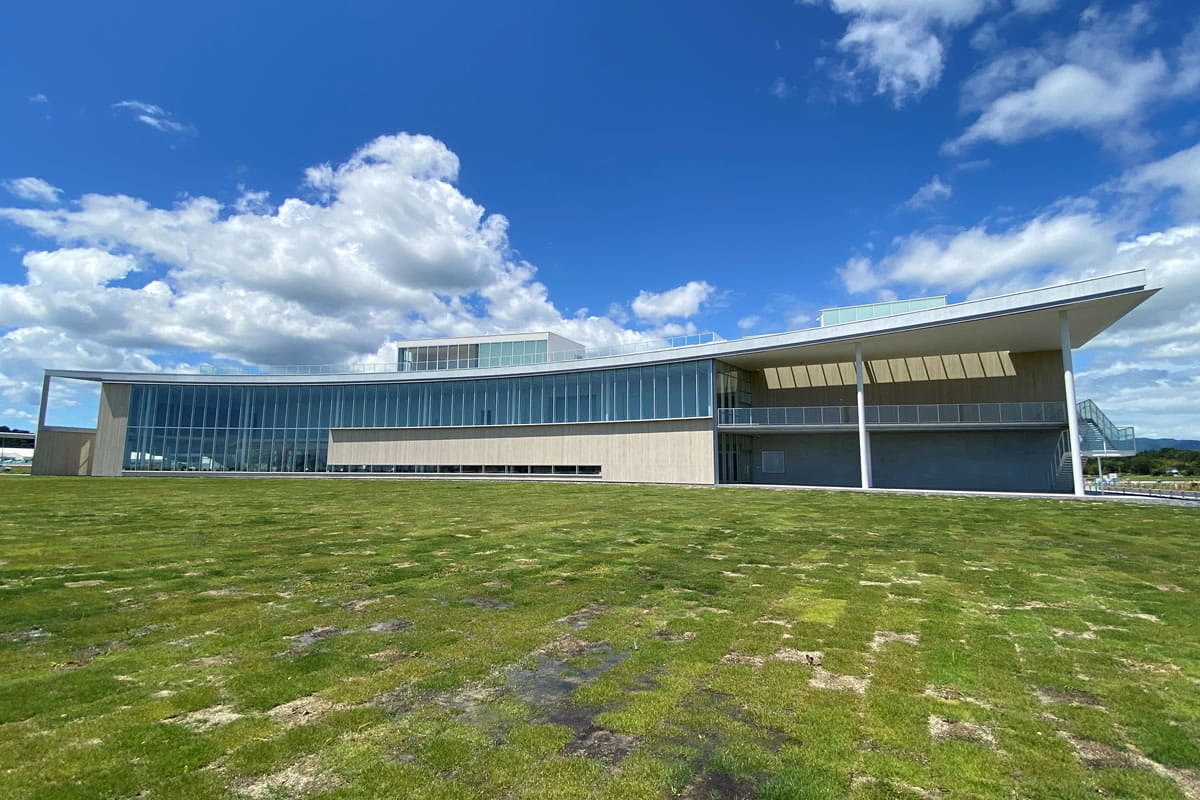
Great East Japan Earthquake and Nuclear Disaster Museum
In order to pass on the records and lessons learned from the unprecedented complex disasters of the Great East Japan Earthquake and the nuclear disaster to future generations, we will disseminate information to prevent the memories of the earthquake from fading, and also use it for disaster prevention and mitigation. We collect and preserve materials related to earthquakes and nuclear disasters, conduct research and research on complex disasters, exhibit them, and conduct training to convey experiences and lessons learned from complex disasters. Additionally, we will promote regional exchanges as an information dissemination base for the Fukushima Innovation Coast Initiative.
Address 39 Nakanotakada, Futaba-machi, Futaba-gun, Fukushima Prefecture Contact information Great East Japan Earthquake and Nuclear Disaster Museum
0240-23-4402URL https://www.fipo.or.jp/lore/ Access About 5 minutes by bus from Futaba Station Holiday Every Tuesday (if Tuesday is a holiday, the following weekday), December 29th to January 3rd Opening hours 9:00 am to 5:00 pm (last admission 4:30 pm) Exhibition admission fee Adult: 600 yen Elementary, junior high and high school: 300 yen
![Tokimeku Tohoku[Tourism web media of six cities in Tohoku]](https://tohoku-kizunamatsuri.jp/special/en/wp-content/themes/touhokubunkatheme_en/assets/img/logo.svg)